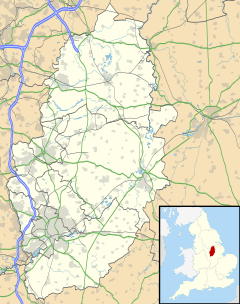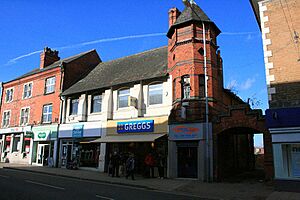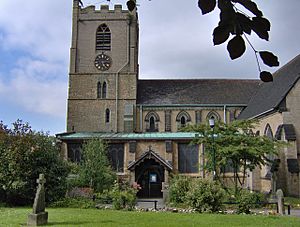Hucknall facts for kids
Quick facts for kids Hucknall |
|
|---|---|
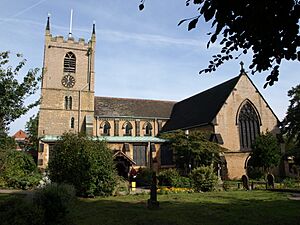 Church of St Mary Magdalene, Hucknall |
|
| Area | 7.913 km2 (3.055 sq mi) |
| Population | 32,107 (2011 census) |
| • Density | 4,058/km2 (10,510/sq mi) |
| OS grid reference | SK 53434 49300 |
| District |
|
| Shire county | |
| Region | |
| Country | England |
| Sovereign state | United Kingdom |
| Post town | Nottingham |
| Postcode district | NG15 |
| Dialling code | 0115 |
| Police | Nottinghamshire |
| Fire | Nottinghamshire |
| Ambulance | East Midlands |
| EU Parliament | East Midlands |
| UK Parliament |
|
Hucknall (/ˈhʌknɔːl/), once known as Hucknall Torkard (/ˈtɔːrkərd/), is a busy market town in Nottinghamshire, England. It's located about 7 miles (11 km) north of the city of Nottingham. Hucknall is the second-largest town in the Ashfield area.
The town sits on the west side of the Leen Valley. The land here gently rises from the Trent Valley in the south. Small streams like the Whyburn (also called Town Brook) flow through the town. Hucknall is very close to Nottingham, almost blending into its suburbs like Bulwell and Bestwood Village.
The highest point in Hucknall is Long Hill, which is about 460 feet (140 meters) above sea level. From here, you can see great views over Nottingham and the Trent Valley. The town is surrounded by farms and parks. To the north-east, you'll find the villages of Linby and Papplewick, and nearby is Newstead Abbey, which was once home to the famous poet Lord Byron. To the east is Bestwood Country Park, a lovely place to explore nature.
Contents
- Hucknall's Past: A Look Back in Time
- Hucknall's Heritage and Tourism
- Getting Around Hucknall: Transport Links
- Learning in Hucknall: Schools and Colleges
- Shopping and Markets in Hucknall
- Hucknall's Industries: Past and Present
- Famous People from Hucknall
- Hucknall's Brass Band
- Cinema in Hucknall
- Sports in Hucknall
- Local Media
Hucknall's Past: A Look Back in Time
Hucknall used to be a very busy market town. The most important building in the town is the Church of St Mary Magdalene, which is right next to the market square.
The church was first built by the Anglo-Saxons and finished after the Normans arrived. Over the years, it has been rebuilt and made bigger, especially in the Victorian era. It has beautiful stained-glass windows, mostly added in the 1880s. There's also a small memorial inside for Lord Byron.
From 1295 until 1915, the town was called Hucknall Torkard. This name came from the Torcard family, who owned a lot of land here. You can still see signs of this older name on some of the town's historic buildings.
The Rise of Coal Mining
In the 1800s and 1900s, coal was found and mined a lot in the Leen Valley, including Hucknall. This brought a lot of money and growth to the town. It also led to the building of three railway lines.
The first railway line was the Midland Railway, which connected Nottingham to Mansfield. This line closed to passengers in 1964 but was later reopened in stages as the Robin Hood Line in the 1990s. Hucknall got a new station on this line in 1993. The other two railway lines also helped transport coal but eventually closed down.
From 1894 to 1974, Hucknall had its own local council, called the Hucknall Urban District Council. After 1974, the local government for Hucknall became part of the Ashfield District Council.
Where Did the Name Hucknall Come From?
The name Hucknall comes from old English words like Hokeuhale or Hokenale. It likely means "nook of land of Hōcanere," referring to a tribe. There are other places nearby with "Hucknall" in their names, like Huthwaite and Ault Hucknall. This suggests that Hucknall might have once been part of a larger area. In the Domesday Book (a very old survey from 1086 CE), the town's name appeared as Hochenale.
Hucknall's Heritage and Tourism
The Hucknall Tourism and Regeneration Group (HTRG) was started in 2002. Its goal is to help Hucknall become a strong and lively town again, especially after the coal mining and textile industries declined. The group wants to attract visitors and help people learn about Hucknall's history.
HTRG works with many local groups, like the Hucknall Heritage Society and the St Mary Magdalene Church. They create leaflets and offer guided walks and bus tours to show off the town's history. They also promote Hucknall through radio and newspapers. In 2017, the town centre became a pedestrian-only area, making it nicer for walking and shopping.
Getting Around Hucknall: Transport Links
Hucknall has good transport connections, especially for a town of its size.
Train Travel in Hucknall
Hucknall once had five train stations, mainly serving the coal mines and factories. Today, the main station is Hucknall railway station on the Robin Hood Line. This line connects Hucknall to Nottingham and Mansfield. Other older stations like Hucknall Town and Hucknall Central have since closed down and their sites have been redeveloped.
Trams: Connecting to Nottingham
Hucknall is the northern end of the Nottingham Express Transit tram system. This tram line was built between 2002 and 2004. It runs from Hucknall, through central Nottingham, all the way to Toton Lane. There's also another tram stop at Butler's Hill.
Bus Services
Local bus services are mainly provided by Trentbarton. The "Threes" bus route connects Hucknall to Nottingham and Mansfield. Other buses, like the 141, link Hucknall to nearby villages such as Linby and Rainworth.
Road Connections
The A611 road used to go through Hucknall, but now it bypasses the town to the west. This road provides easy access to Junction 27 of the M1 motorway, which is about 3 miles (5 km) away.
Learning in Hucknall: Schools and Colleges
Hucknall has several schools and a sixth form centre for older students.
- The National Academy was founded a long time ago in 1788. It moved to a new building in the 1970s. The school has modern facilities, including a large science block and an astro-turf playing area.
- The Holgate Academy is located on Hillcrest Drive.
- Holy Cross Catholic Voluntary Academy is a primary school on Leen Mills Lane. It was recognized as one of the best schools in Nottinghamshire in 2014 and 2015.
- Hucknall Sixth Form Centre is where students from The National Academy, The Holgate Academy, and Queen Elizabeth's Academy go for their post-16 education.
Shopping and Markets in Hucknall
Hucknall has a variety of shops, from large supermarkets to smaller local businesses.
A large Tesco superstore opened in 2003 and was later expanded to a Tesco Extra in 2008. There's also a Tesco Express. Other popular shops include Argos, B&M Bargains, Home Bargains, Boots, Iceland, Aldi, and Sainsbury's.
You can also find independent local shops like Branson's DIY store and Lawrence Severn and Son Ltd, a butcher's shop. For banking, Lloyds has a branch, and you can use the Post Office for some banking services from other banks.
Hucknall has a Friday Market on the pedestrianized High Street. The local council has also started a Saturday market. In 2014, a Costa Coffee opened, and a new McDonald's restaurant opened in 2019.
Hucknall's Industries: Past and Present
Hucknall has a rich history of different industries that helped the town grow.
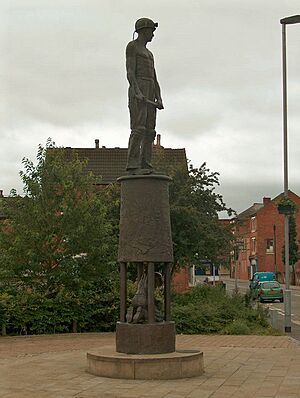
Coal Mining: A Key Industry
For many years, from 1861 to 1986, Hucknall was known as a colliery (coal mining) town. The coal mines helped Hucknall grow into a market town very quickly. The Hucknall Colliery Company opened two main mines: Hucknall No. 1 colliery (Top Pit) in 1861 and Hucknall No. 2 colliery (Bottom Pit) in 1866. The last mine closed in 1986.
Rolls-Royce: Innovation in the Air
Hucknall Airfield was built in 1916. From 1927, Rolls-Royce started using the airfield to test their aircraft. During World War II, the first P-51 Mustang plane fitted with a powerful Merlin Engine took its first flight from Hucknall. This new engine made the Mustang much better at high altitudes.
In the 1950s, the Rolls-Royce site in Hucknall developed the world's first jet aircraft that could take off and land vertically! It was a test machine nicknamed the Flying Bedstead because of its unusual shape. Its first flight was on August 3, 1954, and it could hover and move in all directions. Rolls-Royce's flight test centre closed in 1971, but engine testing continued until 2008.
An interesting story from World War II happened at Hucknall. A German prisoner-of-war named Franz von Werra tried to escape by pretending to be a Dutch pilot and trying to fly away in a Hurricane fighter plane. He was caught and later became the only German prisoner-of-war to successfully escape and return to Germany. His story was even made into a film called The One That Got Away.
Other Industries
In the past, framework knitting (making knitted fabrics) was a very important industry in Hucknall. Today, a large company called Doff Portland is based here. They make garden products like insecticides, weedkillers, and fertilisers, and are one of Europe's biggest makers of slug killer pellets.
Famous People from Hucknall
Hucknall has been home to several notable people:
- Lord Byron (1788–1824), a famous poet and revolutionary, is buried in the parish church.
- Ada Lovelace (1815–1852), Lord Byron's daughter, is also buried in the church. She is known for being the first computer programmer, as she saw the potential of Babbage's early computer design.
- Ben Caunt (1815–1861), a bare-knuckle boxer known as "The Torkard Giant," became the Champion of England. Some say he might have given his name to the famous Parliament bell, Big Ben.
- Eric Coates (1886–1957) was a composer. He wrote the theme music for The Dam Busters movie and the "Sleepy Lagoon" introduction to the radio show Desert Island Discs.
- Andy Turner (born 1980), a sprint hurdler, won gold medals at the 2010 Commonwealth Games and European Athletics Championships.
- Joe Worrall (footballer) (born 1997), a professional footballer, plays as a defender for Nottingham Forest.
Hucknall's Brass Band
The Hucknall and Linby Mining Community Brass Band was formed in 2008. They play concerts at the parish church every Christmas and perform around the local area throughout the year.
Cinema in Hucknall
The Byron Cinema, a beautiful Art Deco building, opened in Hucknall on November 2, 1936. It was a large cinema with 1,189 seats. The local newspaper, the Hucknall Dispatch, praised it as a "delightful house of rest and amusement."
In 1967, the building was split. The ground floor became a bingo club, and the upstairs balcony became a smaller cinema. This cinema finally closed in 2006. However, in 2018, a new company bought the building and reopened it as The Arc Cinema Hucknall. After some delays, it was planned to open in March 2020 as a four-screen cinema.
Sports in Hucknall
Hucknall has a strong sports scene, especially in football.
The town's main football team is Hucknall Town F.C.. It was started in 1945 as a team for the coal miners. The team did very well, even reaching the final of the FA Trophy in 2005. However, they faced financial difficulties and moved to a lower league.
Another football team, Hucknall Rolls Leisure F.C., was formed in 2009 and plays in the Nottinghamshire Senior League.
Hucknall Cricket Club was founded in 1890. They have several teams that play in local leagues.
Hucknall Sports Youth Club, started in 1977, is one of the largest youth sports clubs in Nottinghamshire. They help many young people play football.
Hucknall also has a junior parkrun event that started in 2016 at Titchfield Park, where kids can run for fun.
Local Media
For local news and TV shows, Hucknall is served by BBC East Midlands and ITV Central. Local radio stations include BBC Radio Nottingham and Capital East Midlands. The Hucknall Dispatch is the town's local weekly newspaper.
 | Aurelia Browder |
 | Nannie Helen Burroughs |
 | Michelle Alexander |


